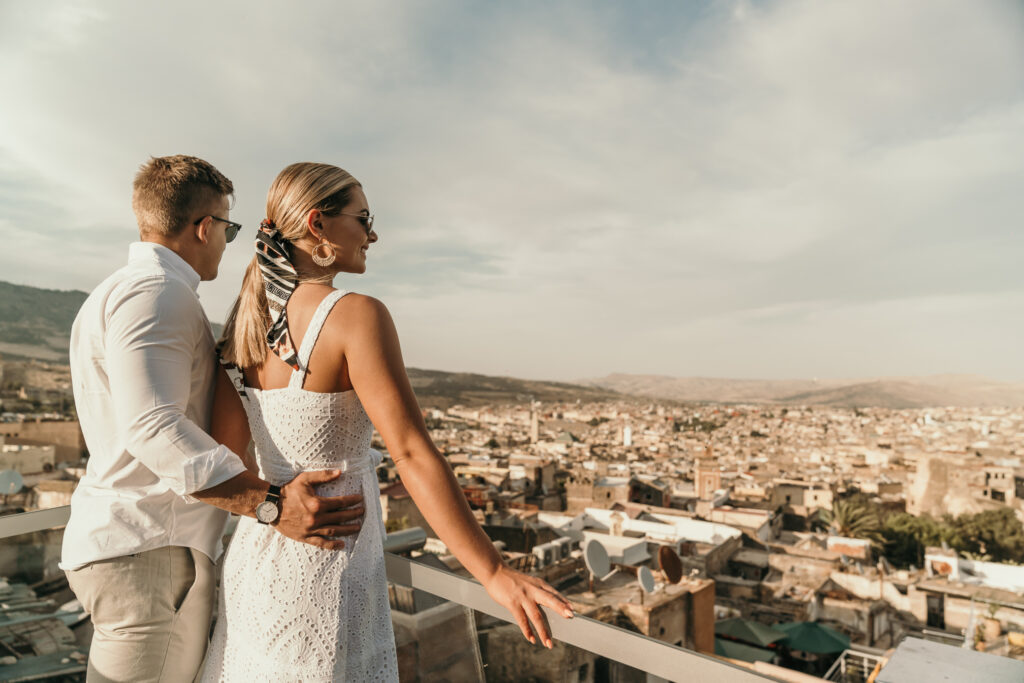One of the perks at my current job is meeting people from all over the world. So far, I have taught English as a second language in New York to students from over 30 countries (I guess I have allowed myself to brag a little now?) Every time I mention Morocco to my students, they speak of Casablanca, Chefchaouen, Tangiers, or Marrakesh. Only a week ago, one of my students asked about my country of origin, I said Morocco, he looked at me confusingly, then he replied: do you mean Fes? I was about to correct him but then I remembered that in Turkey, his home country, and some other European countries Morocco is known as Fes. Why is the name of this city, in some locations, more popular than the name of the country? I wondered.
I still remember the first time I visited Fes. I was invited by a friend I met online (something I did regularly at the time.) We met at the bus station and went for a walk around the new city. Fes felt just like any other Moroccan city: flat, vibrant, loud, and full of delicious smells. We salivated over the smells of the different foods coming from all corners of the streets until we decided to stop at a place (name of a place?) where we had some of the most delicious Tagines I had in my life. It was until the next morning that I discovered the grandiosity of Fes which hit me from all corners as soon as we entered the old Medina. Everything felt dreamlike: from staring at the beautiful artworks aligned at both sides of the narrow alleys to the magnificent, handcrafted carpets, purses, and bags. The occasional smell of kief mystified our visit especially when I examined one of the long wooden pipes which design must date back to at least 200 years ago. We decided to sit at a local cafe, which is ironic, because coffee is not the most consumed drink at places like these. Cafe (name of a cafe?) served a lot of tea to the abundance of youngsters and tourists who occupied its different floors and balconies in such a communal way. My friend and I enjoyed listening to the music played by some of the most talented young musicians in the city. Then, we picked our long tea glasses filled with mint and moved to the balcony where we got to know each other more, played Parcheesi and enjoyed the ever-changing colors of the sun as it slowly hid behind the snowy mountains of the great Atlas.
It would be unfair for any visitors to be surrounded by monuments of such great historical value without knowing the basics. Therefore, here is a glimpse at the tremendous history of Fes. Arguably one of the oldest, if not the oldest city in Arabized Morocco, Fes was founded by the founding father himself Idriss the first, who fled the fall of the Umayyad empire in the east and found refuge at a small Amazigh tribe in Morocco where he married an Amazigh woman and was set to unify the tribes of the far west of North Africa. This city is regarded by Moroccans as one of the biggest cultural treasures in the kingdom. It has been the capital for so long which explains why some people still refer to Morocco as Fez. Tourists often like to visit one of the oldest universities in the world, the university of Al-Karaouine which was founded by a powerful woman named Fatima Al-Fihri in the year 857 (quite progressive, I hear you think.) It is said that the oldest known medical degree in the world has been awarded in this university. Fes was home to some of the greatest thinkers in Moroccan history such as Ibn Khaldun, the great historian whose book Al-Muqaddimah describing north African tribes is regarded as one of the earliest works of sociology, and Leo Africanus who wrote A Description of Africa, a book that illuminated Europe on the cultures and geography of African kingdoms.
There are no better places to grasp the tremendous history of Fes than its magical palaces and riads. Whether you choose to stay at Palais d’Hotes Suites & Spa Fes, Riad Damia, Riad la Maison Verte, or any other architectural masterpieces (there are literally hundreds of options), you will always get to experience the transcendental feelings of being in a completely different dimension while simultaneously asking the famous question: What went wrong architecture-wise? The genius of Moroccan architecture, especially in Fes, makes one believe that this art has only been deteriorating. I get it, there are several modern architectural wonders today, but the beauty of the details scattered in these riads will simply leave anyone in awe. Each of these riads is equipped with the best spas designed specifically to give the visitors an isolating and restful experience. The riads also offer a menu with dishes from all over the country, but especially the popular sweet and savory mixture of traditional Fassi dishes such as the famous pigeon Bastila.
Finally, I would like to go back to the trip I had when I was in high school. I spent a great time with the new friend and unsurprisingly, his family was super hospitable. We are still in touch, and we’ve become close. Which is to say visiting the historical monuments around the city, staying at some of the most beautiful hotels, and trying the scrumptious dishes would simply be incomplete without connecting with some of the locals. As mentioned earlier, meeting people from different countries is my greatest privilege because each person I meet opens a new perspective for me which allows me to dive into the complex beauty of their culture. The connection I have with the people from a certain place boosts my appreciation of that place in magical and inexplicable ways. Our journey in Fes hasn’t come to an end; this is only the beginning.
